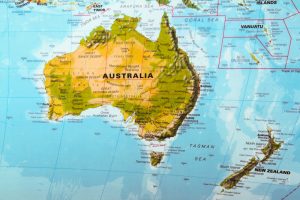After 18 months of being mostly closed off from the rest of the world, Australia is preparing to open up again, allowing its citizens to travel abroad, and potentially welcoming back international visitors.
Australia’s border has remained closed since the pandemic began as it pursued a strategy of eliminating COVID-19. But the Delta variant has now forced the country’s hand.
New South Wales, Australia’s most populous state, is recording record daily cases, while more than 50 percent of the Australian population is now under strict stay at home orders. Prime Minister Scott Morrison, in an op-ed published in Australian newspapers earlier this week, all but conceded defeat on pursuing zero COVID-19.
“A focus on case numbers was very important when we knew nothing about this virus and whether our hospital system would be able to cope. A lot has changed since then. Increasingly we need to look beyond just the case numbers to know what our future holds. How we can keep safe and how we get our lives back in a Covid world,” he wrote.
“So, while right now our national strategy is necessarily about suppressing the virus and vaccinating as many people as possible, a one-eyed focus on just case numbers overlooks the fact that less people are getting seriously ill, let alone dying.”
“Shifting our focus from just case numbers, to actually looking at how many people are becoming seriously ill and requiring hospitalisation will be increasingly what matters. After all, this is how we manage all other infectious diseases.”
Despite cases in Sydney, Australia’s most populous city, reaching a record high of 1,029 on Thursday, the state’s premier, Gladys Berejiklian, is pushing ahead with easing restrictions, a move unthinkable during earlier outbreaks. On Thursday she announced that groups of five, if all are fully vaccinated, will be allowed to gather in outdoor spaces.
Berejiklian then asked the community and industry to prepare to open up when the state hits 70 percent double dose vaccination of the eligible population.
The Australian newspaper reported earlier this week that once the state reaches the 70 percent mark, bars, restaurants, and gyms will be fully open to vaccinated individuals.
Australia’s vaccine rollout was off to a sluggish start, but the vaccination rate has exceeded the height of the rollout in both the U.K. and the U.S. Australia is still behind both countries in percentage of the population fully vaccinated but is due to hit 70 percent nationally by late October and 80 percent just three weeks later.
In anticipation of most Australians being protected from becoming seriously ill from contracting COVID-19, the country’s largest airline, Qantas, announced its strategy for restarting international travel.
“The prospect of flying overseas might feel a long way off, especially with New South Wales and Victoria in lockdown, but the current pace of the vaccine rollout means we should have a lot more freedom in a few months’ time,” said Qantas chief Alan Joyce, in a statement.
“It’s obviously up to government exactly how and when our international borders re-open, but with Australia on track to meet the 80 per cent trigger agreed by National Cabinet by the end of the year, we need to plan ahead for what is a complex restart process.”
The airline said from mid-December, it would resume flights from Australia to COVID-safe destinations, which are likely to include Singapore, the U.K., Canada, Japan, and the U.S. Flights to Hong Kong are expected to resume in February 2022 while the rest of the airline’s international network is planned to open up from April 2022.
The federal government’s Services Australia has already negotiated a deal with Apple and Google to allow iPhone and Android phones to store COVID-19 vaccinations records, which the government said will be necessary for any international travel. The Australian Cabinet has backed the vaccine passport as a way to allow Australians to travel without having to quarantine.
Australia also hopes to welcome back international travelers, but Morrison has stressed that this will rely on Australia being able to trust in partner countries’ vaccine certificates. There have already been reports of the European Union’s COVID Certificates being faked while the U.S. government continues to seize hundreds of fake CDC cards.

































